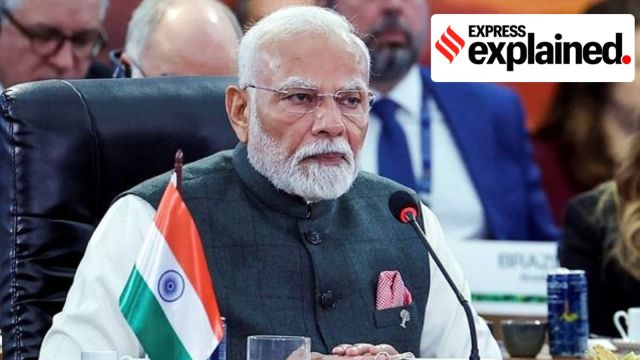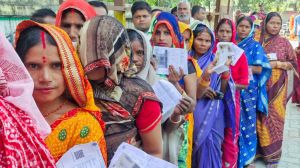As PM Modi lands in Namibia, this is why the country, and the continent of Africa, matters to India
India and Namibia share an old relationship of trust and friendship. There is great potential for a mutually beneficial energy security and critical minerals partnership. India has important stakes in the African continent as a whole, where it hopes to deepen ties of trade, development, and security and energy cooperation.
 Narendra Modi's visit will be the first by an Indian Prime Minister to the resource-rich southern African nation in almost three decades. (X/ANI)
Narendra Modi's visit will be the first by an Indian Prime Minister to the resource-rich southern African nation in almost three decades. (X/ANI)Written by Tabshir Shams
Prime Minister Narendra Modi arrives in Namibia on the final leg of his five-country outreach trip to the Global South on July 9. This will be the first visit by an Indian Prime Minister to the resource-rich southern African nation in almost three decades. Modi’s visit is expected to give a fillip to cooperation between the two countries in technology, health, infrastructure, development, and security.
India-Namibia history of friendship
India and Namibia share a colonial past and a post-colonial partnership.
As early as in 1946, India raised the question of independence for Namibia in the United Nations General Assembly, and the first embassy of the South West Africa People’s Organisation (SWAPO), which led Namibia’s liberation struggle, was established in New Delhi in 1986.
Besides according full diplomatic status and steadfast support through the Non-aligned Movement (NAM), India also offered material assistance and military training to fighters in Namibia’s liberation struggle against the forces of apartheid South Africa.
After Namibian gained independence in March 1990, the Indian Observer Mission in the country was upgraded to a High Commission. Namibia opened its full-fledged resident Mission in New Delhi in March 1994.
Sam Nujoma, the leader of SWAPO and founding President of Namibia, visited India 11 times. In his autobiography, Where Others Wavered: My Life in SWAPO and My Participation in the Liberation Struggle of Namibia, Nujoma wrote: “This was an extremely difficult time for our national liberation movement..we were helped by India which played a very vital role..”
The last Indian Prime Minister to visit Namibia was Atal Bihari Vajpayee, who travelled to Windhoek at the end of August 1998 before heading to Durban for a meeting of NAM. The host country, South Africa, was expected to draft a declaration criticising India’s nuclear test conducted in May that year, and Vajpayee’s visit was aimed at shoring up support from Namibia. As it happened, the Durban declaration only included a call for global nuclear disarmament, which Jawaharlal Nehru had proposed as early as in 1954.
Former President Pranab Mukherjee visited Namibia in 2016. In an address delivered to the Namibian Parliament, he said that India “was proud to stand shoulder to shoulder with the leaders and the people of Namibia in their liberation struggle”, and “remain[ed] committed to a strong development partnership with Namibia in the South-South framework”.
Why Namibia matters to India
India has important stakes in the African continent, where it hopes to deepen ties of trade, development, and security and energy cooperation. By focusing on capacity-building, local ownership, and partnership, and increasing goodwill via moral diplomacy, it hopes to create a long-term, sustainable, post-colonial model of South-South cooperation, with less dependency and more dependability.
With regard to Namibia specifically, the key pillars of the bilateral relationship include critical minerals, energy, economy, capacity-building, and development assistance. Of late, India’s cheetah diplomacy has assumed importance.
Namibia is the third-largest producer of uranium in the world, and one of the largest producers of lithium, zinc, and rare earth metals. There is, thus, great potential for a mutually beneficial energy security and critical mineral partnership.
Economic and commercial ties have become stronger in recent years. Two-way trade touched $654 million between April and November 2023, after registering a 178% growth. India’s exports were at $418 million, and imports from Namibia at $235 million. The main items of trade are mineral oil, pharmaceutical products, machinery, and cereals.
According to India’s Ministry of External Affairs, India’s investments in Namibia are in the order of $800 million, mostly in mineral resources such as zinc and diamond processing.
An ‘India Wing’ has been established at the University of Namibia’s Ongwediwa campus through a grant of about $12 million by India. India has provided training to Namibian defence personnel, diplomats, public health officials, and cricketers under the Indian Technical and Economic Cooperation (ITEC) program, the MEA’s flagship capacity-building initiative.
In March 2021, New Delhi provided 30,000 doses of Covishield Covid-19 vaccines to Namibia. India had gifted rice for drought relief to Namibia earlier in 2019 and 2017, and has helped the country fight natural calamities like drought and floods on multiple occasions. Namibia has extended support to India’s candidature for permanent membership of the UN Security Council.
In 2022, a memorandum of understanding was signed for the translocation of cheetahs from Namibia to reintroduce the big cat in the wild in India. Thereafter, eight cheetahs were flown from Namibia to India, the world’s first intercontinental translocation of a major carnivore species.
India and China in Africa
Over the last 20 years, China has become the largest bilateral trading partner of Africa, with trade volume surpassing $200 billion. India is the fourth largest trading partner of Africa, with trade volumes around $100 billion in 2023.
According to the MEA, India is the 10th largest FDI source for Africa, and has completed 206 infrastructure projects in 43 countries in the continent. Sixty-five projects are under construction.
According to a report by the Confederation of Indian Industry (CII), India has invested $76 billion in Africa since 1996, and this can increase to $150 billion by 2030. The African Continental Free Trade Area (AfCFTA) has expanded India-Africa trade, ensuring economic progress, reducing poverty, and increasing employment opportunities.
China has strengthened its economic cooperation with Africa through various strategic plans and initiatives within the frameworks of its Belt and Road Initiative (BRI) and the Forum on China-Africa Cooperation (FOCAC), a partnership platform that was established in 2000.
However, even as China has been expanding its footprint in Africa and embedding itself in economies and supply chains, concerns have risen over these countries falling into Chinese debt traps.
The Africa Center for Strategic Studies, an institution funded by the US Congress and functioning within the US Department of Defence, says that “China’s Africa policy is part of a global strategy to create dependencies and interdependencies that make countries and regions more inclined to support China’s global ambitions”. Two of Namibia’s most productive mines for radioactive elements are majority-owned by Chinese companies.
India has taken a vastly more expansive and humanitarian view of its engagement with Africa. As early as 2018, Prime Minister Modi had articulated the manner in which India views this relationship: “India’s priority is not just Africa; India’s priority is Africans – every man, woman and child in Africa. Our partnership with Africa is beyond strategic concerns and economic benefits. It is based on the emotional bonds we share and the solidarity we feel.”
The African Union became a permanent member of G20 under India’s presidency. Over the decades, India has given ideological support to Africa via NAM, and contributed to capacity building via ITEC. It has established defence cooperation via the Africa-India field training exercise (AF-INDEX), in which Namibia also participated, the India-Africa defence dialogue in 2022, and the SAGAR – Security and Growth for All in the [Indian Ocean] Region – initiative.
(The writer is a Master’s student of International Relations at South Asian University and a summer intern at The Indian Express.)



- 01
- 02
- 03
- 04
- 05



































